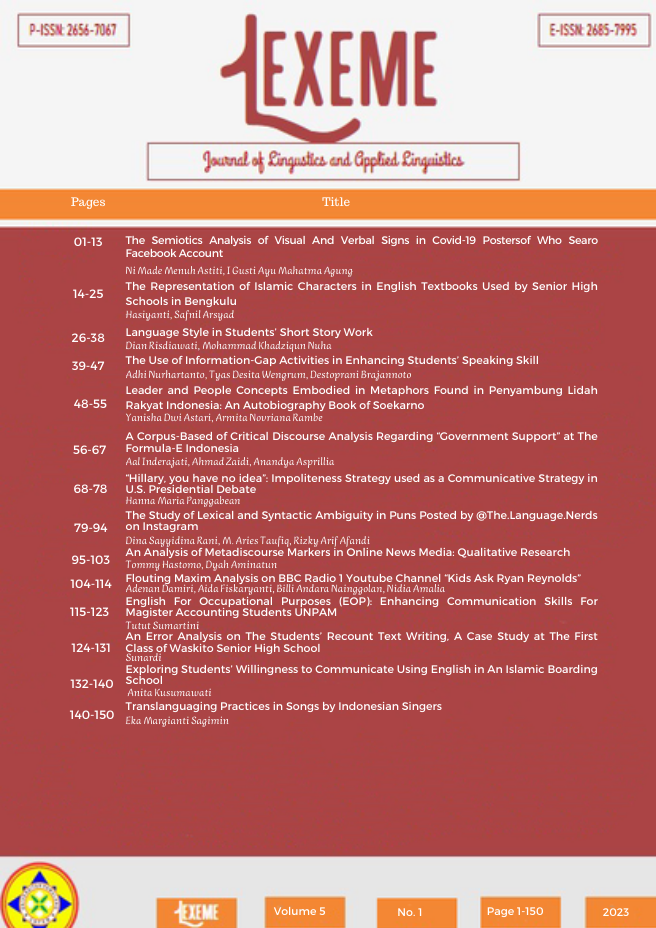“Hillary, you have no ideaâ€: Impoliteness Strategy used as a Communicative Strategy in U.S. Presidential Debate
DOI:
https://doi.org/10.32493/ljlal.v5i1.27044Keywords:
impoliteness strategy, political discourse, U.S. Presidential debate, face-threatening acts, politeness theory.Abstract
Impoliteness is a social phenomenon practically used to threaten someone’s face and an act of raising a conflict in the interaction. However, impoliteness is unable to reveal under politeness theory since it focuses on the constraint of verbal interaction used to save someone’s face (Mohammed & Abbas, 2015, 2016). Therefore, Culpeper (2016) suggests an impoliteness strategy to emphasize some communicative strategies used to damage the hearer’s face. One of the controversial events occurred in a presidential debate between Donald Trump and Hillary Clinton in 2016. This study explored the impoliteness strategy used by the candidates in quantitative and qualitative. This study highlighted the use of positive impoliteness as a defensive communicative strategy and negative impoliteness as an attacking communicative strategy that occurred U.S. Presidential Debate between Donald Trump and Hillary Clinton.
References
Alemi, M., & Latifi, A. (2019). The realization of impoliteness in arguments between the democrats and republicans over the government shutdown issue in the US. Russian Journal of Linguistics, 23(1), 83–97. https://doi.org/10.22363/2312-9182-2019-23-1-83-97
Ardila, J. A. G. (2019). Impoliteness as a rhetorical strategy in Spain ’ s politics. Journal of Pragmatics, 140, 160–170. https://doi.org/10.1016/j.pragma.2018.11.017
Aydınoğlu, N. (2013). Politeness and Impoliteness Strategies: An Analysis of Gender Differences in Geralyn l. Horton’s Plays. Procedia - Social and Behavioral Sciences, 83, 473–482. https://doi.org/10.1016/j.sbspro.2013.06.093
Culpeper, J. (2016). Impoliteness Strategy. Interdisciplinary Studies in Pragmatics, Culture and Society, September, 421–445. https://doi.org/10.1007/978-3-319-12616-6
Fracchiolla, B. (2011). Politeness as a strategy of attack in a gendered political debate-The Royal-Sarkozy debate. Journal of Pragmatics, 43(10), 2480–2488. https://doi.org/10.1016/j.pragma.2011.02.006
GarcÃa, F. F. (2014). Impoliteness, pseudo-politeness, strategic politeness? On the nature of communicative behaviour in electoral debates. Circulo de Linguistica Aplicada a La Comunicacion, 58, 60–89. https://doi.org/10.5209/rev_CLAC.2014.v58.45470
Harris, S. (2001). Being Politically Impolite. Discourse & Society, 12(4), 451–472.
Holmes, J. (2006). Politeness Strategies as Linguistic Variables. Encyclopedia of Language & Linguistics, 684–697.
Mohammed, H. N., & Abbas, N. F. (2015). Pragmatics of Impoliteness and Rudeness. American International Journal of Social Science, 4(6), 195–205. www.aijssnet.com
Mohammed, H. N., & Abbas, N. F. (2016). Impoliteness in literary discourse: A pragmatic study. International Journal of Applied Linguistics and English Literature, 5(2), 76–82. https://doi.org/10.7575/aiac.ijalel.v.5n.2p.76
Neshkovska, S. (2020). Impoliteness on The Political Stage: The Case of the 2019 Final Macedonian Presidential Debate. Lods Papers in Pragmatics, 16(2), 285–304.
Shibamoto-smith, J. S. (2011). Honorifics , ‘“ politeness ,â€â€™ and power in Japanese political debate. Journal of Pragmatics, 43(15), 3707–3719. https://doi.org/10.1016/j.pragma.2011.09.003







